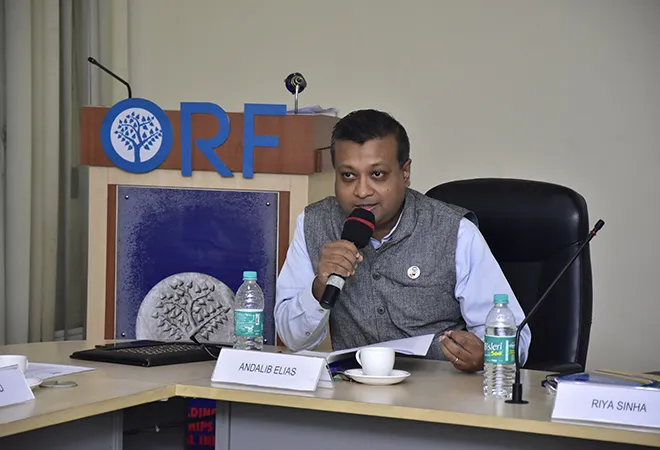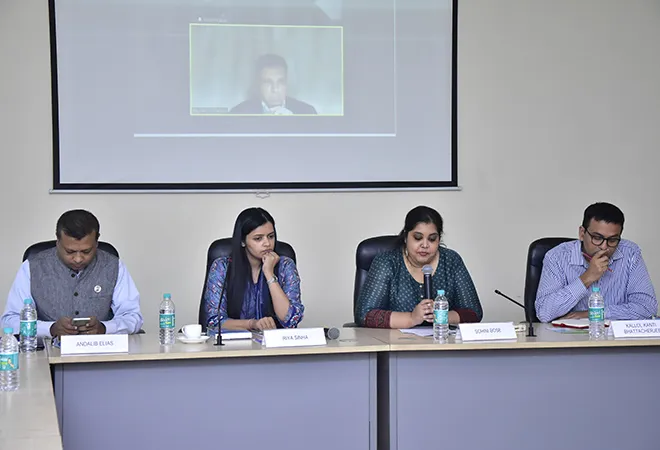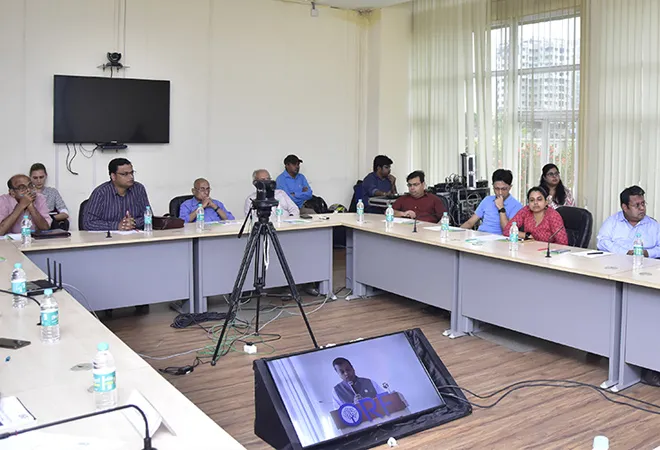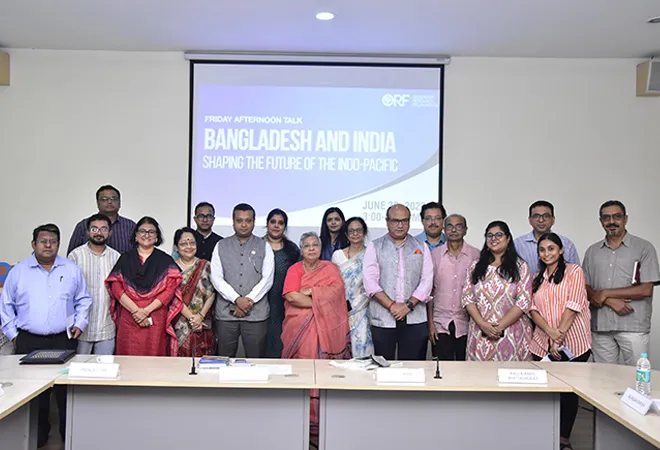The geopolitical construct of the Indo-Pacific is fast becoming a foreign policy priority for many countries, given its economic dynamism and strategic relevance. Although considered a region in itself, it is constituted by several smaller regions with their own aspirations of growth, such as the Bay of Bengal region. For the Indo-Pacific to prosper as a coherent whole, it is, therefore, important that these smaller regions develop through inter-country cooperation and a synchronised vision of the future. Within the Bay of Bengal region, the bilateral relations between India and Bangladesh have emerged as a model for the entire region, with their collaborations ning across sectors. Thus, it is important for both countries to contemplate and work towards a shared future. On 24 April this year, Bangladesh announced its Indo-Pacific Outlook outlining 15 objectives, covering themes of trade, security, connectivity and development. India’s vision of the Indo-Pacific on the other hand, can be pieced together from several policy documents and statements made by key government personnel. As both countries seek a free, open, and inclusive Indo-Pacific, it is important to deliberate on how convergences in these twin perspectives can allow both nations to engage in a sustainable partnership to realise their mutual aspirations.
With this objective, Observer Research Foundation, Kolkata organised an hour-long panel discussion on “Bangladesh and India: Shaping the Future of the Indo-Pacific,” in hybrid mode on 30 June 2023, as a part of its Friday Afternoon Talk Series. The discussion featured four panellists; Rashed Uz Zaman, Professor, International Relations, University of Dhaka, Bangladesh; Shomi Kaiser, Bangladesh Member in the Executive Committee of SAARC Chamber of Commerce and Industry and Founder of e-Commerce Association of Bangladesh; Kallol Bhattacherjee, Senior Assistant Editor, The Hindu, India; and Riya Sinha, Associate Fellow, Centre for Social and Economic Progress, India. It was moderated by Sohini Bose, Junior Fellow, ORF, India.
Delivering the Opening Remarks, Nilanjan Ghosh, Director CNED and ORF Kolkata, highlighted that Bangladesh is India’s largest development and trading partner in Soth Asia, and India is Bangladesh’s second-largest trading partner. The two countries are recognised as double engines of growth based on their four kinds of capital; abundantly available cheap human capital, a social value entrenched social capital, an extremely rich biodiversity as natural capital and manufactured capital in the form of extensive growth in physical infrastructure. Convergences in their vision of the Indo-Pacific will allow both countries to utilise the four kinds of capital for collaborations in connectivity, infrastructure building and sustainable investment, to realise mutual aspirations, as well as benefit the Bay of Bengal region.

Elaborating on Bangladesh’s Indo-Pacific Outlook in his Special Remarks, Andalib Elias, Deputy High Commissioner of Bangladesh in Kolkata, highlighted that, its foremost guiding principle is a maxim of Bangabandhu Sheikh Mujibur Rahman, which has so far shaped the country’s foreign policy; “Friendship to all, malice to none”. Accordingly, Bangladesh does not subscribe to any military alliance, rather its objective is world security, in keeping with its role as one of the largest contributors of peacekeeping force alongside India. It is fully committed to all UN conventions, policies and principles. The Outlook is based on its constitutional values of political independence, peaceful settlement of disputes and non-interference in internal matters of other nation-states. Within the Indo-Pacific, Bangladesh focuses on collaboratively developing niche areas ranging from women empowerment to peace and security, climate change, and disaster management. He particularly laid emphasis on transforming the role of women from the worst sufferers of climate-induced disasters to becoming pillars of disaster risk resilience. Bangladesh has tried to promote this role of women in COP26 and COP27, and is eager to do the same via its Indo-Pacific Outlook, working in tandem with India and other like-minded nations. This note of multi-dimensional collaboration between India and Bangladesh set the context for the panel discussion.
Deliberating on the Indo-Pacific Outlook of Bangladesh, the panellists shared that there was a need to move beyond traditional geopolitics and understand the country from the prism of ‘geopolitics of emotion’- a concept highlighted by Dominique Moisi in his book titled
The Geopolitics of Emotion: How Cultures of Fear, Humiliation and Hope are Reshaping the World. In the case of Bangladesh, this emotion is particularly one of hope, coming naturally to its citizens after overcoming insurmountable challenges since its liberation in 1971. The reduction in its poverty rate, socio-economic growth and the development in its human development index has made the people of Bangladesh aspirational about their future. Thus, they seek greater economic prosperity through improved trade, connectivity and infrastructural development, which finds reflection in the Indo-Pacific Outlook. Partnership with India is vital in realising these objectives.

Indian investments and foreign assistance have been critical to Bangladesh’s rise as a high performer in multiple sectors such as renewable energy, agriculture, Small and medium-sized enterprises (SMEs) and Information and Communications Technology (ICT). After the boom in the Ready-Made Garment Industry, the SMEs and ICTs are contributing substantially to the latter’s economy. As Bangladesh envisions becoming “Smart Bangladesh” by 2041, four pillars are critical to its goal; Smart Citizens, Smart Government, Smart Economy and Smart Society. ICT plays a crucial role in realising this vision and can benefit through private sector collaborations with India, in skill development, capacity building and technological exchanges. The criticality of this collaboration was underlined by the Prime Ministers of India and Bangladesh during the latter’s last visit to India in September 2022. Building on the ICT network, both countries must expand on cultural trade and in time foster an ecosystem for it within the platforms of SAARC, BIMSTEC and the Commonwealth, in which both are members.
The very conceptualisation of the notion of the Indo-Pacific, created within itself a role for Bangladesh, a part which the country has chosen to assume in recent months. Over the years, Bangladesh has created its identity as a pragmatic power much like Vietnam and South Korea which despite being cautious are experiencing rapid economic growth. Its political leadership has a clear vision of its social, economic and political priorities and hence seeks collaborations with India and other like-minded countries in various fields of development-an idea which is amply reflected in the Indo-Pacific Outlook.
India’s approach towards geopolitics can be visualized in concentric circles, where the neighbourhood is the innermost circle guided by its Act East and Neighbourhood First Policy, gradually moving on to the extended neighbourhood and then the wider Indo-Pacific. Connectivity, trade, infrastructure and capacity building are constant features of India’s engagements in the Indo-Pacific. The country deems such ties as important not only from the security perspective but also for mutual economic development- as is manifested in its relation with Bangladesh. The Bay of Bengal is a central part of this cooperation as a shared maritime space, connecting the two countries with its other littorals and the wider Indo-Pacific. An interest to find a foothold in the resource-rich Bay, has also brought many major powers such as Japan and Australia to the shores of India and Bangladesh. These countries are rapidly becoming part of the Bay of Bengal growth story with their investments in connectivity and infrastructure building in both countries, creating in effect trilateral cooperations which hold significance for the wider Indo-Pacific region.

However, the panellists expressed that there remain challenges in the region which need to be overcome by both countries through collaboration. Maritime security in the Bay of Bengal in terms of maintaining freedom of navigation and overflight is vital. Bangladesh considers the Bay to be its third neighbour and for India, it is a primary area of interest, given that both depend on the sea for more than 90 percent of their trade. As the world becomes more and more confrontational it is natural therefore for both countries to uphold the rule of law via the UNCLOS in the Bay. Climate security in the Bay is especially important as the Bay suffers from chronic natural disasters. It was also noted that India and Bangladesh can utilise BIMSTEC, to help its other members such as Myanmar mitigate concerns such as the Rohingya crisis through dialogue.
In the context of trade, it was pointed out that there is a need to focus on the development of cross-border policy in Bangladesh and improve logistics-communication facilities. These aspects will be important, especially in the context of Bangladesh expected to become South Asia's largest outsourcing hub by 2026. Sea trade is an important aspect of India-Bangladesh bilateral relations and has doubled in the last decade. It can be further improved by addressing practical challenges such as shortage of vessels, dearth of mutual recognition agreements in commodities, need for mutual recognition of seafarers and vessel certification, need for cooperative training protocols to utilise coastal shipping routes and need to improve hard and soft infrastructure at seaports. India can assist Bangladesh in this regard. In conclusion, it was agreed convergences in Indo-Pacific priorities and approaches between India and Bangladesh will strengthen existing cooperation and open avenues for sustainable partnership, benefitting the region.
This event report was written by Sohini Bose, Junior Fellow, ORF, Kolkata with inputs from Debosmita Sarkar, Junior Fellow, ORF, Kolkata, and Arnab Sarkar, Intern, ORF, Kolkata.
The views expressed above belong to the author(s). ORF research and analyses now available on Telegram! Click here to access our curated content — blogs, longforms and interviews.

 Elaborating on Bangladesh’s Indo-Pacific Outlook in his Special Remarks, Andalib Elias, Deputy High Commissioner of Bangladesh in Kolkata, highlighted that, its foremost guiding principle is a maxim of Bangabandhu Sheikh Mujibur Rahman, which has so far shaped the country’s foreign policy; “Friendship to all, malice to none”. Accordingly, Bangladesh does not subscribe to any military alliance, rather its objective is world security, in keeping with its role as one of the largest contributors of peacekeeping force alongside India. It is fully committed to all UN conventions, policies and principles. The Outlook is based on its constitutional values of political independence, peaceful settlement of disputes and non-interference in internal matters of other nation-states. Within the Indo-Pacific, Bangladesh focuses on collaboratively developing niche areas ranging from women empowerment to peace and security, climate change, and disaster management. He particularly laid emphasis on transforming the role of women from the worst sufferers of climate-induced disasters to becoming pillars of disaster risk resilience. Bangladesh has tried to promote this role of women in COP26 and COP27, and is eager to do the same via its Indo-Pacific Outlook, working in tandem with India and other like-minded nations. This note of multi-dimensional collaboration between India and Bangladesh set the context for the panel discussion.
Deliberating on the Indo-Pacific Outlook of Bangladesh, the panellists shared that there was a need to move beyond traditional geopolitics and understand the country from the prism of ‘geopolitics of emotion’- a concept highlighted by Dominique Moisi in his book titled The Geopolitics of Emotion: How Cultures of Fear, Humiliation and Hope are Reshaping the World. In the case of Bangladesh, this emotion is particularly one of hope, coming naturally to its citizens after overcoming insurmountable challenges since its liberation in 1971. The reduction in its poverty rate, socio-economic growth and the development in its human development index has made the people of Bangladesh aspirational about their future. Thus, they seek greater economic prosperity through improved trade, connectivity and infrastructural development, which finds reflection in the Indo-Pacific Outlook. Partnership with India is vital in realising these objectives.
Elaborating on Bangladesh’s Indo-Pacific Outlook in his Special Remarks, Andalib Elias, Deputy High Commissioner of Bangladesh in Kolkata, highlighted that, its foremost guiding principle is a maxim of Bangabandhu Sheikh Mujibur Rahman, which has so far shaped the country’s foreign policy; “Friendship to all, malice to none”. Accordingly, Bangladesh does not subscribe to any military alliance, rather its objective is world security, in keeping with its role as one of the largest contributors of peacekeeping force alongside India. It is fully committed to all UN conventions, policies and principles. The Outlook is based on its constitutional values of political independence, peaceful settlement of disputes and non-interference in internal matters of other nation-states. Within the Indo-Pacific, Bangladesh focuses on collaboratively developing niche areas ranging from women empowerment to peace and security, climate change, and disaster management. He particularly laid emphasis on transforming the role of women from the worst sufferers of climate-induced disasters to becoming pillars of disaster risk resilience. Bangladesh has tried to promote this role of women in COP26 and COP27, and is eager to do the same via its Indo-Pacific Outlook, working in tandem with India and other like-minded nations. This note of multi-dimensional collaboration between India and Bangladesh set the context for the panel discussion.
Deliberating on the Indo-Pacific Outlook of Bangladesh, the panellists shared that there was a need to move beyond traditional geopolitics and understand the country from the prism of ‘geopolitics of emotion’- a concept highlighted by Dominique Moisi in his book titled The Geopolitics of Emotion: How Cultures of Fear, Humiliation and Hope are Reshaping the World. In the case of Bangladesh, this emotion is particularly one of hope, coming naturally to its citizens after overcoming insurmountable challenges since its liberation in 1971. The reduction in its poverty rate, socio-economic growth and the development in its human development index has made the people of Bangladesh aspirational about their future. Thus, they seek greater economic prosperity through improved trade, connectivity and infrastructural development, which finds reflection in the Indo-Pacific Outlook. Partnership with India is vital in realising these objectives.
 Indian investments and foreign assistance have been critical to Bangladesh’s rise as a high performer in multiple sectors such as renewable energy, agriculture, Small and medium-sized enterprises (SMEs) and Information and Communications Technology (ICT). After the boom in the Ready-Made Garment Industry, the SMEs and ICTs are contributing substantially to the latter’s economy. As Bangladesh envisions becoming “Smart Bangladesh” by 2041, four pillars are critical to its goal; Smart Citizens, Smart Government, Smart Economy and Smart Society. ICT plays a crucial role in realising this vision and can benefit through private sector collaborations with India, in skill development, capacity building and technological exchanges. The criticality of this collaboration was underlined by the Prime Ministers of India and Bangladesh during the latter’s last visit to India in September 2022. Building on the ICT network, both countries must expand on cultural trade and in time foster an ecosystem for it within the platforms of SAARC, BIMSTEC and the Commonwealth, in which both are members.
The very conceptualisation of the notion of the Indo-Pacific, created within itself a role for Bangladesh, a part which the country has chosen to assume in recent months. Over the years, Bangladesh has created its identity as a pragmatic power much like Vietnam and South Korea which despite being cautious are experiencing rapid economic growth. Its political leadership has a clear vision of its social, economic and political priorities and hence seeks collaborations with India and other like-minded countries in various fields of development-an idea which is amply reflected in the Indo-Pacific Outlook.
India’s approach towards geopolitics can be visualized in concentric circles, where the neighbourhood is the innermost circle guided by its Act East and Neighbourhood First Policy, gradually moving on to the extended neighbourhood and then the wider Indo-Pacific. Connectivity, trade, infrastructure and capacity building are constant features of India’s engagements in the Indo-Pacific. The country deems such ties as important not only from the security perspective but also for mutual economic development- as is manifested in its relation with Bangladesh. The Bay of Bengal is a central part of this cooperation as a shared maritime space, connecting the two countries with its other littorals and the wider Indo-Pacific. An interest to find a foothold in the resource-rich Bay, has also brought many major powers such as Japan and Australia to the shores of India and Bangladesh. These countries are rapidly becoming part of the Bay of Bengal growth story with their investments in connectivity and infrastructure building in both countries, creating in effect trilateral cooperations which hold significance for the wider Indo-Pacific region.
Indian investments and foreign assistance have been critical to Bangladesh’s rise as a high performer in multiple sectors such as renewable energy, agriculture, Small and medium-sized enterprises (SMEs) and Information and Communications Technology (ICT). After the boom in the Ready-Made Garment Industry, the SMEs and ICTs are contributing substantially to the latter’s economy. As Bangladesh envisions becoming “Smart Bangladesh” by 2041, four pillars are critical to its goal; Smart Citizens, Smart Government, Smart Economy and Smart Society. ICT plays a crucial role in realising this vision and can benefit through private sector collaborations with India, in skill development, capacity building and technological exchanges. The criticality of this collaboration was underlined by the Prime Ministers of India and Bangladesh during the latter’s last visit to India in September 2022. Building on the ICT network, both countries must expand on cultural trade and in time foster an ecosystem for it within the platforms of SAARC, BIMSTEC and the Commonwealth, in which both are members.
The very conceptualisation of the notion of the Indo-Pacific, created within itself a role for Bangladesh, a part which the country has chosen to assume in recent months. Over the years, Bangladesh has created its identity as a pragmatic power much like Vietnam and South Korea which despite being cautious are experiencing rapid economic growth. Its political leadership has a clear vision of its social, economic and political priorities and hence seeks collaborations with India and other like-minded countries in various fields of development-an idea which is amply reflected in the Indo-Pacific Outlook.
India’s approach towards geopolitics can be visualized in concentric circles, where the neighbourhood is the innermost circle guided by its Act East and Neighbourhood First Policy, gradually moving on to the extended neighbourhood and then the wider Indo-Pacific. Connectivity, trade, infrastructure and capacity building are constant features of India’s engagements in the Indo-Pacific. The country deems such ties as important not only from the security perspective but also for mutual economic development- as is manifested in its relation with Bangladesh. The Bay of Bengal is a central part of this cooperation as a shared maritime space, connecting the two countries with its other littorals and the wider Indo-Pacific. An interest to find a foothold in the resource-rich Bay, has also brought many major powers such as Japan and Australia to the shores of India and Bangladesh. These countries are rapidly becoming part of the Bay of Bengal growth story with their investments in connectivity and infrastructure building in both countries, creating in effect trilateral cooperations which hold significance for the wider Indo-Pacific region.
 However, the panellists expressed that there remain challenges in the region which need to be overcome by both countries through collaboration. Maritime security in the Bay of Bengal in terms of maintaining freedom of navigation and overflight is vital. Bangladesh considers the Bay to be its third neighbour and for India, it is a primary area of interest, given that both depend on the sea for more than 90 percent of their trade. As the world becomes more and more confrontational it is natural therefore for both countries to uphold the rule of law via the UNCLOS in the Bay. Climate security in the Bay is especially important as the Bay suffers from chronic natural disasters. It was also noted that India and Bangladesh can utilise BIMSTEC, to help its other members such as Myanmar mitigate concerns such as the Rohingya crisis through dialogue.
In the context of trade, it was pointed out that there is a need to focus on the development of cross-border policy in Bangladesh and improve logistics-communication facilities. These aspects will be important, especially in the context of Bangladesh expected to become South Asia's largest outsourcing hub by 2026. Sea trade is an important aspect of India-Bangladesh bilateral relations and has doubled in the last decade. It can be further improved by addressing practical challenges such as shortage of vessels, dearth of mutual recognition agreements in commodities, need for mutual recognition of seafarers and vessel certification, need for cooperative training protocols to utilise coastal shipping routes and need to improve hard and soft infrastructure at seaports. India can assist Bangladesh in this regard. In conclusion, it was agreed convergences in Indo-Pacific priorities and approaches between India and Bangladesh will strengthen existing cooperation and open avenues for sustainable partnership, benefitting the region.
However, the panellists expressed that there remain challenges in the region which need to be overcome by both countries through collaboration. Maritime security in the Bay of Bengal in terms of maintaining freedom of navigation and overflight is vital. Bangladesh considers the Bay to be its third neighbour and for India, it is a primary area of interest, given that both depend on the sea for more than 90 percent of their trade. As the world becomes more and more confrontational it is natural therefore for both countries to uphold the rule of law via the UNCLOS in the Bay. Climate security in the Bay is especially important as the Bay suffers from chronic natural disasters. It was also noted that India and Bangladesh can utilise BIMSTEC, to help its other members such as Myanmar mitigate concerns such as the Rohingya crisis through dialogue.
In the context of trade, it was pointed out that there is a need to focus on the development of cross-border policy in Bangladesh and improve logistics-communication facilities. These aspects will be important, especially in the context of Bangladesh expected to become South Asia's largest outsourcing hub by 2026. Sea trade is an important aspect of India-Bangladesh bilateral relations and has doubled in the last decade. It can be further improved by addressing practical challenges such as shortage of vessels, dearth of mutual recognition agreements in commodities, need for mutual recognition of seafarers and vessel certification, need for cooperative training protocols to utilise coastal shipping routes and need to improve hard and soft infrastructure at seaports. India can assist Bangladesh in this regard. In conclusion, it was agreed convergences in Indo-Pacific priorities and approaches between India and Bangladesh will strengthen existing cooperation and open avenues for sustainable partnership, benefitting the region.